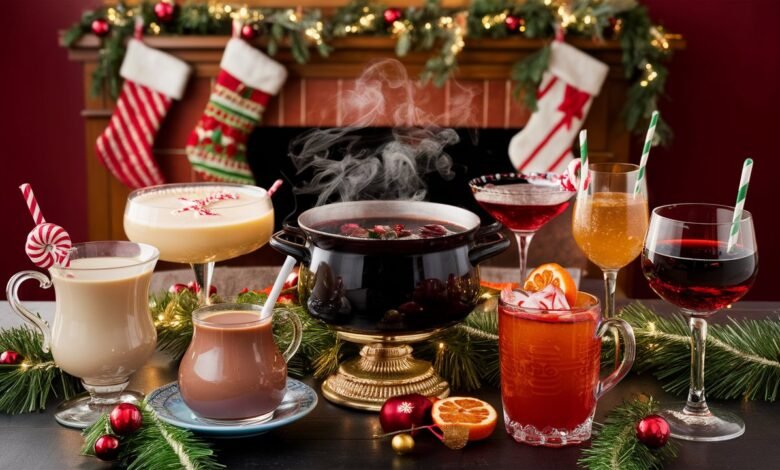Festive Sips: Elevating Your Holidays with Irresistible Christmas Beverages

Introduction
As frost gathers on windowpanes and twinkling lights illuminate the streets, Christmas Beverages unveils its magic not just through decorations, but through the shared warmth of seasonal beverages. These drinks—steaming, spiced, or sparkling—serve as liquid ambassadors of holiday cheer, weaving nostalgia, comfort, and celebration into every sip. From centuries-old recipes passed down through generations to modern twists igniting new traditions, Christmas beverages transcend mere refreshment. They embody the spirit of togetherness, whether sipped beside a crackling fire, shared during festive feasts, or offered as a welcoming gesture to carolers at the door. In this deep dive into yuletide libations, we explore the history, flavors, and cultural tapestry that make these drinks indispensable to the holiday experience. Prepare to discover how humble ingredients like cinnamon, cocoa, and cranberries transform into elixirs of joy, uniting families and friends in the most delicious way possible.
The Timeless Allure of Hot Chocolate: A Winter Staple
Hot chocolate reigns as the undisputed monarch of Christmas comfort drinks, its origins tracing back to Mesoamerican rituals long before European adaptation. Modern iterations balance decadence and simplicity—rich cocoa melded with velvety milk or cream, often elevated by a cloud of homemade marshmallows or a whisper of vanilla. What distinguishes Christmas hot chocolate is its ceremonial preparation: slowly whisking dark chocolate shavings into simmering milk, infusing spices like nutmeg or cayenne for warmth, or crowning it with peppermint sticks that melt into swirls of festive flavor. This beverage’s power lies in its versatility; it serves as a canvas for creativity, whether spiked with Irish cream for adults or dotted with snowman-shaped sprinkles for children. Its universal appeal bridges generations, making it a cornerstone of holiday memory-making.
Mulled Wine: A Spiced Symphony of European Tradition
Steeped in medieval European history, mulled wine (or glühwein) transforms inexpensive red wine into a fragrant potion through patient simmering with citrus and spices. Cloves, star anise, and cinnamon sticks release their essential oils into the wine, while orange zest adds brightness against the tannic backbone. Traditionally served at German Christmas markets amid falling snow, this drink’s alchemy lies in balancing sweetness—often from honey or brown sugar—with the acidity of the wine and the bite of spirits like brandy. The ritual of preparing mulled wine is as cherished as drinking it; the pot’s gentle steam carries aromas that perfume the entire home, signaling festivity. For a non-alcoholic variant, spiced apple cider mirrors the complexity, using black tea for depth and cranberry juice for tartness.
Eggnog’s Rich Legacy: From Colonial America to Global Icon
Eggnog’s creamy, custard-like texture and heady blend of nutmeg and bourbon evoke immediate holiday recognition. Born from British posset (a medieval drink of curdled milk and ale), it gained fame in American colonies where rum, abundant from Caribbean trade, replaced ale. Today, it sparks passionate debate: store-bought convenience versus homemade authenticity. The latter involves carefully tempering egg yolks with hot milk to create a silken base, then folding in whipped egg whites for ethereal lightness. Aged versions, spiked with dark rum or cognac and rested for weeks, develop complex, mellow notes. Beyond sipping, eggnog inspires desserts—from French toast to ice cream—proving its culinary versatility. Its enduring appeal lies in its unabashed indulgence, embodying the “treat yourself” ethos of the season.
Crafting Non-Alcoholic Festive Elixirs: Inclusive Cheer
The rise of sophisticated zero-proof beverages ensures everyone partakes in holiday toasts. Cranberry sparklers, for instance, marry tart juice with ginger beer and rosemary sprigs, creating a ruby-red drink that’s visually and palatably festive. Slow-cooked wassail—an ancient English punch blending baked apples, ale (or apple cider), and orchard fruits—offers depth without alcohol, while chai-infused hot apple cider marries seasonal produce with exotic spices. These drinks prioritize layered flavors: think pomegranate molasses for tang, cardamom pods for floral warmth, or edible gold dust for glamour. Serving them in elegant glassware with garnishes (cinnamon-dusted orange wheels, sugared cranberries) reinforces their ceremonial role, proving that abstaining from alcohol needn’t mean compromising on complexity or celebration.
Coffee Creations: Caffeinated Holiday Magic
Christmas mornings demand coffee elevated beyond the everyday. Peppermint mochas, with their harmony of bitter espresso, chocolate syrup, and candy-cane essence, offer a jolt of joy, while gingerbread lattes channel cookie nostalgia via molasses and clove-infused milk. The secret to café-quality drinks at home lies in technique: frothing milk to velvety microfoam, brewing espresso at precise temperatures, and crafting syrups from scratch (simmering real vanilla beans or toasting spices before steeping). For a showstopping presentation, rim mugs with crushed cookies or drizzle designs with caramel. These beverages marry necessity with luxury, energizing gift-unwrapping marathons while feeling like a decadent treat—a true holiday multitasker.
Conclusion
Christmas beverages are more than fleeting trends; they’re sensory time capsules capturing the essence of the season. Each steaming mug of spiced wine, each frosty glass of eggnog, carries within it centuries of tradition, innovation, and communal joy. As you stir pots of cocoa or garnish sparkling punches this year, remember that these rituals forge connection—across dinner tables, between cultures, and through generations. Whether reviving ancestral recipes or inventing new ones, you’re participating in a global tapestry of holiday warmth. So raise your cup: here’s to the drinks that turn moments into memories, and holidays into heartwarming celebrations.
Frequently Asked Questions
Q: Can I make non-alcoholic eggnog?
Absolutely! Replace spirits with vanilla extract or rum flavoring. Use pasteurized eggs for safety, or try a cooked version by heating eggs and milk to 160°F (71°C) before chilling.
Q: How long can I store homemade mulled wine?
Refrigerated, it keeps for 3–4 days. Reheat gently to avoid boiling off alcohol. Note: prolonged storage may intensify spice bitterness.
Q: What’s a quick festive drink for unexpected guests?
Mix equal parts cranberry juice and ginger ale over ice. Add frozen cranberries and a cinnamon stick garnish—ready in 2 minutes!
Q: Are there vegan alternatives to classic Christmas drinks?
Yes! Use almond or oat milk in hot chocolate, coconut cream in eggnog, and ensure wine is vegan-friendly for mulled versions (many fined wines use animal products).
Q: How can I make coffee drinks less sweet without losing flavor?
Opt for dark chocolate in mochas, reduce syrup by half, and emphasize spices (cinnamon, nutmeg) to add complexity without sugar overload.
Q: What’s a traditional Christmas beverage from another country?
Try Mexico’s ponche navideño—a fruit punch with tejocotes, hibiscus, and sugarcane, or Sweden’s julmust, a spiced cola-like soda enjoyed during December.



